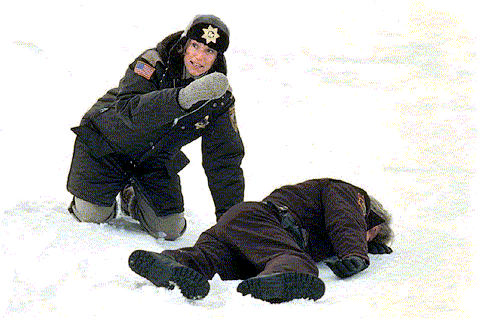 Fargo
Fargo
 Fargo
Fargo

Roger Ebert Review:
FARGO begins with an absolutely dead-on familiarity with small-town life in the frigid winter landscape of Minnesota and North Dakota. Then it rotates its story through satire, comedy, suspense, and violence, until it emerges as one of the best films I've seen. To watch it is to experience steadily mounting delight, as you realize the filmmakers have taken enormous risks, gotten away with them, and made a movie that is completely original, and as familiar as an old shoe—or a rubber-soled hunting boot from L. L. Bean, more likely.
The film is "based on a true story" that took place in Minnesota in 1987. It has been filmed on location, there and in North Dakota, by the Coen brothers, Ethan and Joel, who grew up in St. Louis Park, a suburb of Minneapolis, and went on to make good movies like BLOOD SIMPLE, MILLER'S CROSSING and BARTON FINK, but never before a film as wonderful as this one, shot in their own backyard.
To describe the plot is to risk spoiling its surprises. I will tread carefully. A car salesman named Jerry Lundegaard (William H. Macy) desperately needs money for a business deal—a parking lot scheme that can save him from bankruptcy. He is under the thumb of his rich father-in-law (Harve Presnell), who owns the car agency, and treats him like a loser. Jerry hires a couple of scrawny low-lifes named Showalter and Grimsrud (Steve Buscemi and Peter Stormare) to kidnap his wife (Kristin Rudrud), and promises to split an $80,000 ransom with them. Simple enough, except that everything goes wrong in completely unanticipated ways, as the plot twists and turns and makes a mockery of all of Jerry's best thinking.
Showalter is nervous, sweaty, talkative, mousy. Grimsrud is a sullen slug of few words. During the course of the kidnapping, he unexpectedly kills some people ("Oh, Daddy!" says Showalter, terrified). The bodies are found the next morning, frozen beside the highway, in the barren lands between Minneapolis and Brainerd, MN, which is, as we are reminded every time we see the hulking statue outside town, the home of Paul Bunyan.
Brainerd's police chief is a pregnant woman named Marge Gunderson (Frances McDormand). She talks like one of the McKenzie Brothers, in a Canadian-American-Scandinavian accent that's strong on cheerful folksiness. Everybody in the movie talks like that, with lines like "You're dern tootin'." When she gets to the big city, she starts looking for a place with a good buffet.
Marge Gunderson needs a jump to get her patrol car started in the morning. But she is a gifted cop, and soon after visiting the murder site, she reconstructs the crime—correctly. Eyewitnesses place two suspects in a tan Ciera. She traces it back to Jerry Lundegaard's lot. "I'm a police officer from up Brainerd," she tells him, "investigating some malfeasance."
Jerry, brilliantly played by Macy, is a man weighed down by the insoluble complexities of the situation he has fumbled himself into. He is so incompetent at crime that, when the kidnapping becomes unnecessary, he can't call off the kidnappers, because he doesn't know their phone number. He's being pestered with persistent calls from GMAC, inquiring about the illegible serial number on the paperwork for the same missing brown Ciera. He tries sending faxes in which the number is smudged. GMAC isn't fooled. Macy creates the unbearable agony of a man who needs to think fast, and whose brain is scrambled with fear, guilt, and the crazy illusion that he can somehow still pull this thing off.
FARGO is filled with dozens of small moments that make us nod with recognition. When the two low-rent hoods stop for the night at a truck stop, for example, they hire hookers. Cut to a shot of bored mercenary sex. Cut to the next shot: They're all sitting up in bed, watching "The Tonight Show" on TV. William H. Macy, who has played salesmen and con men before (he's a veteran of David Mamet's plays), finds just the right note in his scenes in the auto showroom. It's fascinating to watch him in action, trying to worm out of a lie involving an extra charge for rust-proofing.
Small roles seem bigger because they're so well written and observed. Kristen Rudrud has few scenes as Jerry's wife, but creates a character out of them, always chopping or stirring something furiously in the kitchen. Their teenage son, who excuses himself from the table to go to McDonald's, helps establish the milieu of the film with a bedroom that has a poster on its wall for the Accordion King. Marge, discussing a hypothetical killer who has littered the highway with bodies, observes matter-of-factly, "I doubt he's from Brainerd." Harve Presnell is a typical self-made millionaire in his insistence on delivering the ransom money himself: He earned it, and by God if anyone is going to hand it over, it'll be him. He wants his money's worth. And on the way to the violent and unexpected climax, Marge has a drink in her hotel buffet with an old high school chum who obviously still lusts after her, even though she's married and pregnant. He explains, in a statement filled with the wistfulness of the downsizable, "I'm working for Honeywell. If you're an engineer, you could do a lot worse."
Frances McDormand has a lock on an Academy Award nomination with this performance, which is true in every individual moment, and yet slyly, quietly, over the top in its cumulative effect. The screenplay is by Ethan and Joel Coen (Joel directed, Ethan produced), and although I have no doubt that events something like this really did take place in Minnesota in 1987, they have elevated reality into a human comedy—into the kind of movie that makes us hug ourselves with the way it pulls off one improbable scene after another. Films like FARGO are why I love the movies.
View The Classic Archive
Home